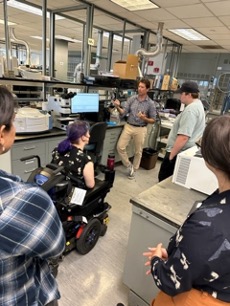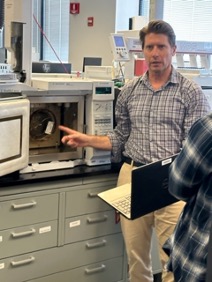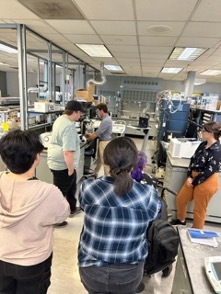PC3 Participants Experience the Impact of Science at FDA Lab Tour
Students in the new University of Michigan Pharmacy Community College Connect (PC3) Program saw science in action this summer, learning first-hand how product testing protects us all when they toured the US Food and Drug Administration’s Detroit Lab.
The PC3 students — all from tribal and community colleges from across the state of Michigan— spent ten weeks on campus exploring the field of pharmacy and the many career opportunities it offers. A highlight of the experience was a visit to the FDA lab on July 24.
FDA chemist Michael Truchan gave the students an overview of the Detroit Lab’s work. That includes drug quality sampling and testing, bioresearch monitoring, health fraud prevention, and a product shelf-life extension program.
“Every day I see the importance of our work. FDA is here to protect the public,” Truchan told students. As he toured students through working lab areas, he shared real-life examples.
For instance, he explained the science behind gas chromatography and how the Detroit Lab used that technique during the COVID-19 pandemic to test hand sanitizers for strength and undeclared adulterants.
In another example that likely resonated with students, Truchan described the lab’s role in investigating the EVALI Outbreak, a spike in severe pulmonary disease, that began to appear in the Midwest in June and July of 2019 among adolescents who reported vaping.
Truchan demonstrated how field labs used FTIR technology to screen for the presence of cutting agents such as Vitamin E acetate and polyethylene glycol in THC vaping products during the E-cigarette/Vaping Associated Lung Injury (EVALI) crisis.
“Nearly every time we saw a machine during our FDA tour, I remembered using it in organic chemistry! It was very cool to see them used in a real-life context, and it gave me a greater appreciation for my chemistry classes,” said Zoe Gargiulo, now a current U-M Student.
“I think everyone thoroughly enjoyed the visit and the time we spent with FDA,” said Madison Jeffrey, assistant program manager for PC3. “The students were very engaged during the presentation and the tour. They asked many questions,” Truchan added. The student visit was recently highlighted on the FDA’s internal website.
In its inaugural year, the PC3 Program welcomed 7 students from tribal and community colleges with a potential interest in pharmacy careers. The program engages participants in different pharmacy-related experiences while providing a stipend, academic advising, peer-to-peer mentoring, job shadowing and career exploration.
|
FDA chemist Michael Truchan demonstrated how field labs used FTIR technology to screen for the presence of cutting agents such as Vitamin E acetate and polyethylene glycol in THC vaping products during the E-cigarette/Vaping Associated Lung Injury (EVALI) crisis in 2019. |
FDA chemist Michael Truchan explains to Pharmacy Community College Connect students the science behind gas chromatography and how this technique was used during the pandemic to test hand sanitizers for strength and adulterants. |
PC3 participants get a close-up look at science in action, observing how lab technology tests products for safety. |






